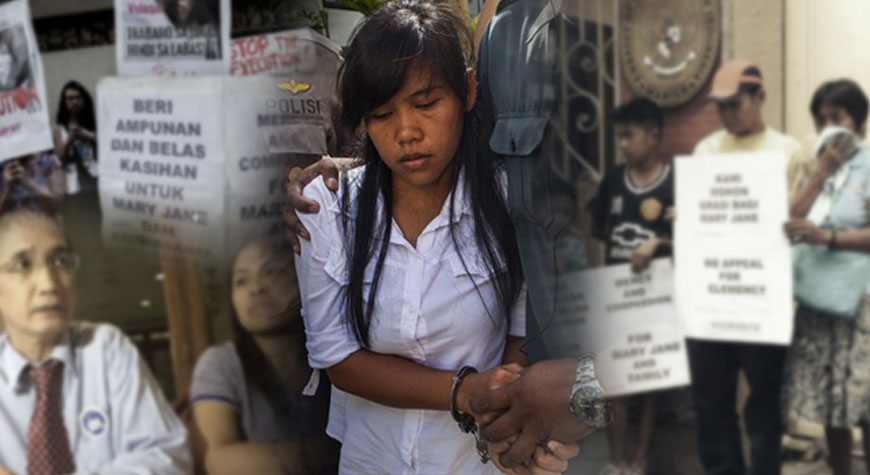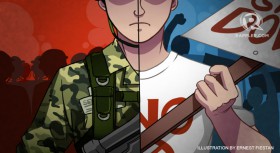There is an organization in the United States that called Law Enforcement Against Prohibition or LEAP. I like this organization because of its advocacy. It takes the position that in order to minimize the harm that drugs like heroin do to society, all recreational drugs should be legalized.
This is not to say that LEAP does not consider drug abuse a serious health and social concern. It does not advocate drug abuse. It does, however, think that governments should not use legal measures like incarceration and the death penalty to solve health problems like drug abuse.
The evidence that the prohibition of drugs is not working is clear. The growing menace of drugs, despite all the legal measures against it, is the stuff of newspapers, the winning platform of cheap political campaigns, and one of the best fear-mongering gimmicks that authoritarian regimes use when they want to scare people into accepting restrictions of their freedoms.
There is also good evidence that legalization works in diminishing the bad effects of recreational drug use. Legalization decreases criminality, the power of the drug syndicates, and reduces the health burden on individuals and the health care system. When drugs are legalized, the government controls the manufacture, import, selling, and use of drugs instead of the criminal syndicates.
The support for legalizing addictive recreational substances is in almost every country. Cigarettes have no medical value and are, in fact, proven to cause a variety of health problems including cancer. Alcohol is another frequently abused recreational substance that does severe damage to the alcoholic, his or her family, and society at large. The World Health Organization reports that alcohol causes 3.3 million deaths a year and is a factor in over 200 disease and injury conditions, including the course of infectious diseases like tuberculosis and HIV and AIDS. Yet governments do not ban alcohol and cigarettes. Instead, they regulate it, as evidenced by a new law in Indonesia that prohibits alcohol sales in small stores to protect the youth.
Regulating the manufacture of alcohol also allows government to ensure that the products sold are not toxic or poisonous – something that is a problem of heroin users worldwide who die, not just from overdose but often also from contaminated supplies.
Prohibition causes more problems
Toxic alcoholic drinks were, of course, a problem during the days of alcohol prohibition in the United States. Another problem during the era of alcohol prohibition was the rise of mobsters and crime syndicates who had such tremendous untaxed wealth that they could bribe law enforcement officers and judges. Because these people could not go to the legal system to resolve disputes, gang wars were common. Violence and murder were part of the illegal alcohol trade.
Substitute the term "alcohol" for "heroin" (the drug Mary Jane Veloso allegedly smuggled) and you have the same problem today. Then as now, those who get caught and punished for drug trafficking are the small drug mules who may be unwitting conspirators, the poor and the colored. The syndicate bosses don't get caught.
Because illegality makes drug profit margins ridiculously high, drug bosses accumulate tremendous wealth and, in many countries, use this wealth to control politicians and judges. In my mind, this is a far greater threat than the addiction and anti-social behavior caused by drugs. Indeed it is the illegality of drugs that causes both the empowerment of big-time criminals and many of the anti-social behaviors of drug users. Apart from this, legalizing drugs does not increase use and banning them does not decrease use.
Using tobacco again as an example, cigarette smoking has decreased tremendously worldwide (though tobacco is one of the most addictive of substances) through effective public education and anti-addiction services. So, instead of spending so much money on law enforcement, countries are better off spending it on health education and treatment programs. Taxes coming from the controlled sale of these substances can also be put into the health care system, something ensured in the Philippines by the sin tax law.
Death penalty is barbaric
The death penalty, the most draconian of all prohibition measures, does not deter drug trafficking.
As a whole, the death penalty is not a deterrent to crime. Instead, the death penalty is a serious form of human rights violation that does not befit any nation that claims to be a democracy and a member of the community of nations. It violates the basic human right to life.
Furthermore, it violates the human right not be subjected to any cruel and unusual punishment. Consider that no justice system on earth is perfect. The likelihood that a mistake will be made and an innocent person proclaimed guilty is always there. In countries like Indonesia and the Philippines, developing nations with many problems besetting the justice system, the miscarriage of justice is a daily reality. It is certainly within the realm of possibility that a poor Filipina looking for work as a domestic helper is made into an unwitting drug mule. Since the death penalty is irreversible, it does not take a genius to realize that this is indeed a cruel and unusual form of punishment.
The toughest of the tough
In the last few days, before the 11th-hour reprieve of Mary Jane Veloso, Indonesia's President Joko Widodo had been talking tough about the majesty of the law. Maybe he should talk tough about the majesty of international human rights law instead. He should be reminded that resolutions in the United Nations General Assembly calling for a global moratorium on the death penalty has passed 5 times since 2007, with the latest resolution passing just last December 2014. Each resolution shows a diminishing number of countries opposed to the resolution.
My Indonesian friends in the social movement, and all those of us who wish for Indonesia a better future, rejoiced at President Widodo's election. Many of us believed him to be a human rights advocate, one who knew the plight of the poor and disempowered, like Mary Jane Veloso.
The tough talk was also echoed by Indonesian Attorney General HM Prasetyo, who said, "Don't force us to cancel or postpone the executions. If we do, we will be perceived as weak."
Perhaps Prasetyo should be told about the people in the organization LEAP. He might think these are hippies and progressives. They are not. They are former police chiefs, former drug agents, former prosecutors and judges, many of whom fought the US war on drugs. In short, the toughest of the tough.
If Prasetyo and Widodo want the world to see how tough they are, they should do what is not politically expedient and stop the executions. They should also begin to ease Indonesia's unacceptably harsh and misguided drug policies. They should apologize to the international community for the execution of all those people with drug related cases.
Tough people listen to science and obey human rights standards. As the people in LEAP show us, the really tough people don't kill powerless drug addicts and drug mules. They would abolish the death penalty, begin more tolerant drug policies, and set Mary Jane Veloso free, without batting an eyelash.
Sylvia Estrada Claudio is a doctor of medicine who also holds a PhD in Psychology. She is Professor of the Department of Women and Development Studies, College of Social Work and Community Development, University of the Philippines, and the co-founder and Chair of the Board of Likhaan Center for Women's Health.
*This story was first published in Rappler.com, a Manila-based social news network where stories inspire community engagement and digitally fuelled actions for social change. Illustration is from Rappler.








Comments